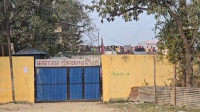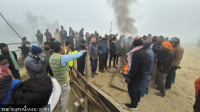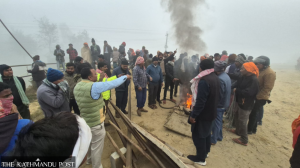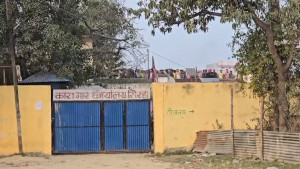Madhesh Province
Development projects in Madhesh fuel monsoon fears
Lack of disaster-sensitive planning has put lives and livelihoods at risk in the province, say officials.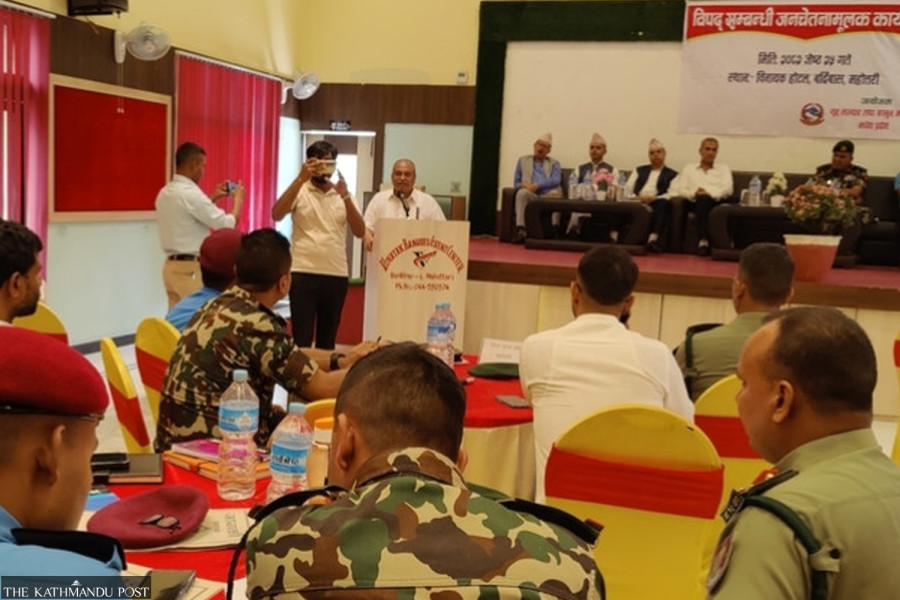
Sunita Baral
Failure to give due importance to disaster sensitivity while implementing development projects has left Madhesh Province at risk of monsoon-induced disasters.
According to authorities concerned and stakeholders speaking at a disaster awareness programme held in Bardibas on Sunday, development activities in Madhesh are putting communities at risk due to the lack of disaster sensitivity. The event was organised by the provincial Ministry of Home Affairs, Communication and Law.
Speakers expressed concerns that many settlements vulnerable to flooding and riverbank erosion are being exposed to even greater risks by insensitive development practices. “In many places, roads are built by blocking drainage systems or obstructing the natural flow of water. Poor waste and sewage management, and leaving construction work incomplete and materials unattended, are causing additional disaster risks,” said Narayan Prasad Risal, the chief district officer of Mahottari.
Risal emphasised the urgent need for coordination among all stakeholders and agencies during development planning and implementation. “Several settlements across seven municipalities in Mahottari live under the constant fear of flooding and erosion during the monsoon,” he said.
According to the Madhesh Province Police Office in Janakpur, out of the province’s total population of 61,26,228, over 52,000 households—representing approximately 2,28,687 people—are at risk of monsoon-induced disasters. The stakeholders further say that the absence of verified data from local municipalities has made it difficult to formulate effective preparedness and response plans.
"Disaster risk is being increased, not reduced, by the way development is currently being carried out," warned Dhan Bahadur Chand from the United Nations Development Programme (UNDP). “If we continue to destroy the Chure hills, overexploit natural resources and advance development projects without assessing disaster risks, we are inviting serious crises in the future,” he cautioned.
The representatives of the federal and the provincial government raise questions about the lackadaisical response of the local units. Shankar Hari Acharya, chief district officer of Dhanusha, criticised the local governments for their lack of cooperation. “Municipalities do not provide accurate data, do not attend district disaster management meetings and fail to support planning efforts. These weaknesses must be addressed at the earliest to mitigate disasters,” he said.
According to the data at the Madhesh Province Police Office in Janakpur, a total of 422 people lost their lives in the current fiscal year of 2024-24 due to disasters such as fires, floods, storms, lightning strikes, drownings and wild animal attacks. The region experienced 2,258 disaster incidents, injuring over 900 people and causing economic damage amounting to nearly Rs 567 million.
The growing incidents of drowning are quite alarming in the province lately. Open pits left behind after road construction or gravel extraction turn into death traps during the monsoon. The danger peaks during the monsoon when construction and road expansion projects coincide, and rain quickly fills open pits.
In the past three years, a total of 542 people have drowned across the province, including 321 (or around 59 percent) children. The number of these preventable deaths continues to rise each year.
Deputy Inspector General (DIG) of the Madhesh Province Police, Uma Prasad Chaturvedi, stressed the need for local governments to identify high-risk zones and proactively use their allocated budgets to procure disaster response materials. “The local bodies must become more alert, active and sensitive toward disaster risks,” he said.
The security agencies underscore the need for proper preparedness and coordination among the stakeholders to mitigate the monsoon-induced disasters. Krishna Dhakal, DIG of the Armed Police Force, said that proper preparedness is essential given the limited resources available. “All stakeholders must contribute to disaster preparedness in a coordinated and systematic way,” he added.
Minister of Home Affairs, Communication and Law Rajkumar Lekhi acknowledged that disaster response and security have not been prioritised adequately by the government so far. “Due to this neglect, we've had to work with limited resources. But the new policies and programmes being developed by this government will aim to reduce disaster risks with proper planning,” he assured.
The programme concluded with a shared understanding that only disaster-sensitive development, backed by reliable data and proactive coordination among agencies, can reduce the growing threat faced by Madhesh communities each monsoon season.




 18.12°C Kathmandu
18.12°C Kathmandu

